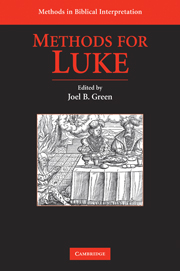3 - Feminist Criticism
Published online by Cambridge University Press: 05 June 2012
Summary
Among feminist interpreters, the Gospel of Luke is contested ground. The interpretations are not only diverse but marked by contradiction. Early feminist studies on Luke were almost programmatically positive, looking for and calling forth the unusually large number of women who are mentioned in the text. However, this was soon challenged by a far more critical evaluation maintaining that Luke represented a rhetorical strategy whereby women were restricted to silence and subservience.
It is therefore no coincidence that the introduction to the volume on the Gospel of Luke in the series “A Feminist Companion” begins with two paragraphs, each representing an established feminist position on Luke, and the one contradicting the other. Some hold that “the Gospel of Luke celebrates women's discipleship, self-determination, and leadership even as it heralds a reversal of systemic inequities,” whereas others claim that “the Gospel of Luke threatens any attempt made by women, the poor or the disenfranchised to find a voice in either society or church. The narrative consistently depicts women in ancillary capacities.…Luke's gospel is a menacing text that retains and reinforces kyriarchal structures.” Interpreters do often disagree, but how are such extremely opposed positions, equally committed to the common cause of feminist criticism, possible in relation to the same source? Is a middle ground possible? Is a middle ground even desirable or required?
THE MULTIPLICITY OF FEMINIST CRITICISMS
Feminist criticism on Luke is a showcase for the observation that commitment to feminism does not lead to uniformity.
- Type
- Chapter
- Information
- Methods for Luke , pp. 42 - 73Publisher: Cambridge University PressPrint publication year: 2010

